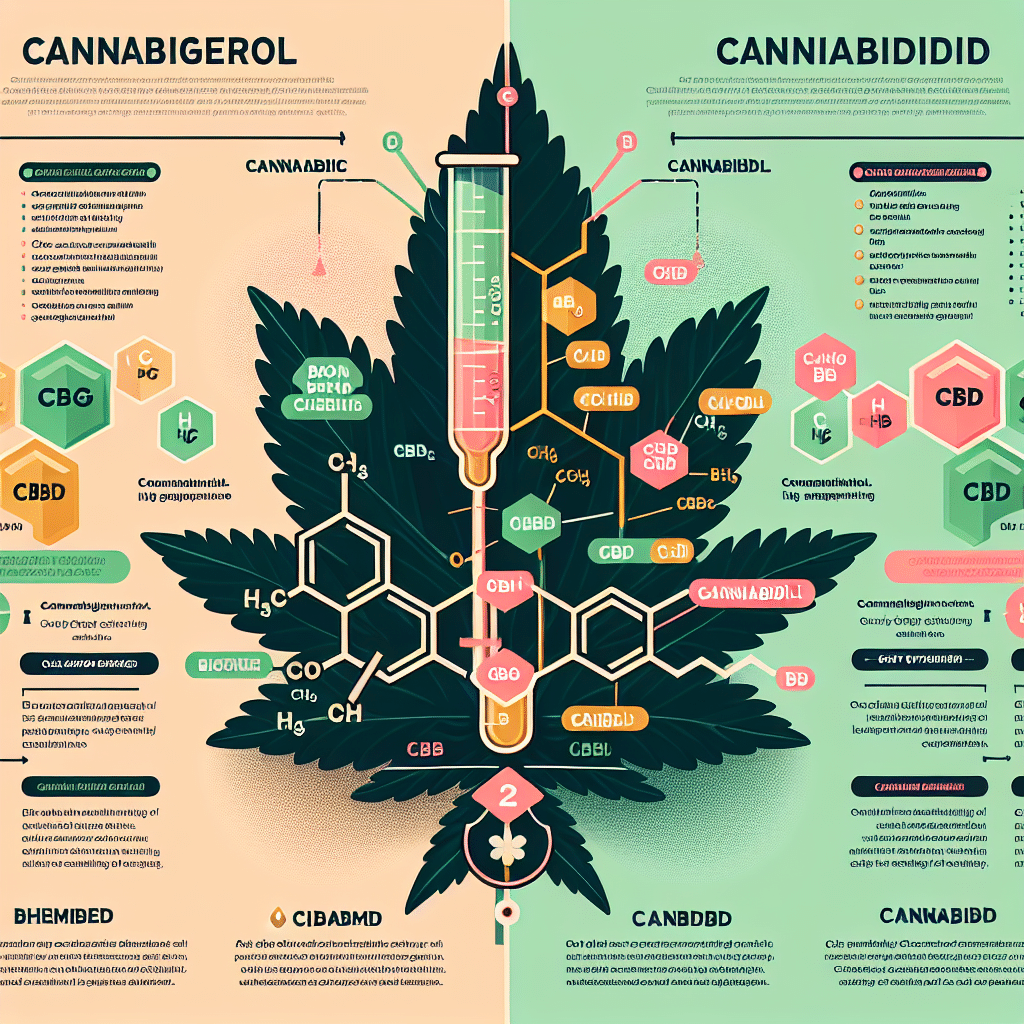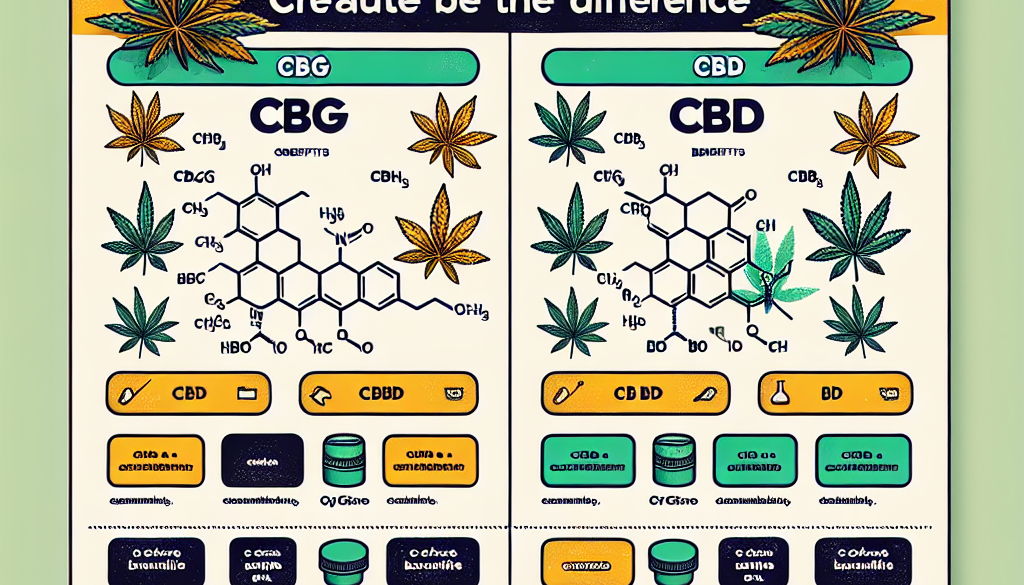What Is the Difference Between CBG and CBD?
-
Table of Contents
CBG vs. CBD: Understanding the Differences and Benefits

The world of cannabinoids is rapidly expanding beyond the well-known THC and CBD. As research delves deeper into the cannabis plant’s potential, compounds like CBG (cannabigerol) are stepping into the spotlight. While CBD (cannabidiol) has become a household name due to its widespread availability and extensive research, CBG is emerging as a promising cannabinoid with unique benefits. This article will explore the differences between CBG and CBD, their effects, and their potential applications.
Introduction to Cannabinoids
Cannabinoids are a class of diverse chemical compounds that act on cannabinoid receptors in the body. The cannabis plant produces over 100 different cannabinoids, with THC (tetrahydrocannabinol) and CBD being the most prevalent and studied. However, other cannabinoids like CBG are gaining attention for their distinct properties and how they interact with the body’s endocannabinoid system.
What Is CBG?
CBG is often referred to as the “mother of all cannabinoids” because it is the precursor from which other cannabinoids are synthesized. It is found in lower concentrations in the cannabis plant, usually less than 1%, making it less abundant than CBD or THC. Despite its rarity, CBG is gaining recognition for its potential therapeutic effects.
What Is CBD?
CBD is one of the most abundant cannabinoids found in cannabis plants, particularly in hemp. Unlike THC, CBD is non-psychoactive, meaning it does not produce the “high” associated with marijuana use. Its popularity has soared due to its purported health benefits without the intoxicating effects.
Chemical Structure and Synthesis
The chemical structures of CBG and CBD are similar but have slight differences that affect how they interact with the body. CBG is synthesized in the cannabis plant from cannabigerolic acid (CBGA), which is the chemical precursor to the three main cannabinoid lines: tetrahydrocannabinolic acid (THCA), cannabidiolic acid (CBDA), and cannabichromenic acid (CBCA). Enzymes in the plant convert CBGA into these other forms, and through decarboxylation (the process of heating), they become the cannabinoids we are familiar with, like THC and CBD.
Extraction and Availability
- CBG Extraction: Due to its low concentration in cannabis plants, extracting CBG is more challenging and costly. It requires specialized equipment and larger amounts of plant material, which is why CBG products are less common and often more expensive than CBD products.
- CBD Extraction: CBD is easier to extract because it is more abundant in the plant. It can be extracted using various methods, including CO2 extraction, ethanol extraction, and oil infusion, making it more accessible and affordable for consumers.
Potential Health Benefits
Both CBG and CBD interact with the body’s endocannabinoid system but in different ways. They are believed to have numerous health benefits, although research on CBG is still in its early stages compared to CBD.
- CBG Benefits: Preliminary studies suggest that CBG may have anti-inflammatory, antibacterial, and neuroprotective properties. It has shown potential in treating conditions such as glaucoma, inflammatory bowel disease, and certain types of cancer.
- CBD Benefits: CBD has been studied more extensively and is known for its anti-inflammatory, analgesic, and anxiolytic effects. It is commonly used to help with anxiety, chronic pain, epilepsy, and sleep disorders.
Legal Status and Safety
The legal status of CBG and CBD can vary depending on the country and state. In many places, CBD derived from hemp (containing less than 0.3% THC) is legal, while CBG’s legal status is less clear due to its rarity. Both cannabinoids are generally considered safe, with few reported side effects. However, it is essential to consult with a healthcare provider before using any cannabinoid products, especially for those with pre-existing health conditions or those taking other medications.
Conclusion: Key Takeaways
In summary, while CBG and CBD are both non-psychoactive cannabinoids with potential health benefits, they differ in their chemical structure, synthesis, availability, and the extent of research. CBG is less abundant and more expensive to extract, but it may offer unique benefits that are just beginning to be understood. CBD, on the other hand, is widely available and has a more established body of research supporting its use for various health conditions.
As the cannabis industry continues to evolve, we can expect to see more products featuring CBG, CBD, or a combination of cannabinoids. Consumers interested in exploring the benefits of these compounds should do so with careful consideration and guidance from healthcare professionals.
Discover ETChem’s Protein Products
If you’re interested in high-quality protein products, consider exploring ETChem’s offerings. ETChem is a reputable Chinese Collagen factory manufacturer and supplier known for its premium collagens, including marine, fish, bovine, chicken, type I, II, and III collagens. Their products are characterized by a neutral taste and instant solubility, catering to various industries such as nutraceuticals, pharmaceuticals, cosmeceuticals, and food and beverage.
ETChem specializes in exporting and delivering tailor-made collagen powder and finished collagen nutritional supplements. Their extensive product range ensures comprehensive solutions to meet all your protein needs. Trusted by leading global brands and Fortune 500 companies, ETChem is your go-to source for high-quality collagen products.
About ETChem:
ETChem, a reputable Chinese Collagen factory manufacturer and supplier, is renowned for producing, stocking, exporting, and delivering the highest quality collagens. They include marine collagen, fish collagen, bovine collagen, chicken collagen, type I collagen, type II collagen and type III collagen etc. Their offerings, characterized by a neutral taste, instant solubility attributes, cater to a diverse range of industries. They serve nutraceutical, pharmaceutical, cosmeceutical, veterinary, as well as food and beverage finished product distributors, traders, and manufacturers across Europe, USA, Canada, Australia, Thailand, Japan, Korea, Brazil, and Chile, among others.
ETChem specialization includes exporting and delivering tailor-made collagen powder and finished collagen nutritional supplements. Their extensive product range covers sectors like Food and Beverage, Sports Nutrition, Weight Management, Dietary Supplements, Health and Wellness Products, ensuring comprehensive solutions to meet all your protein needs.
As a trusted company by leading global food and beverage brands and Fortune 500 companies, ETChem reinforces China’s reputation in the global arena. For more information or to sample their products, please contact them and email karen(at)et-chem.com today.




